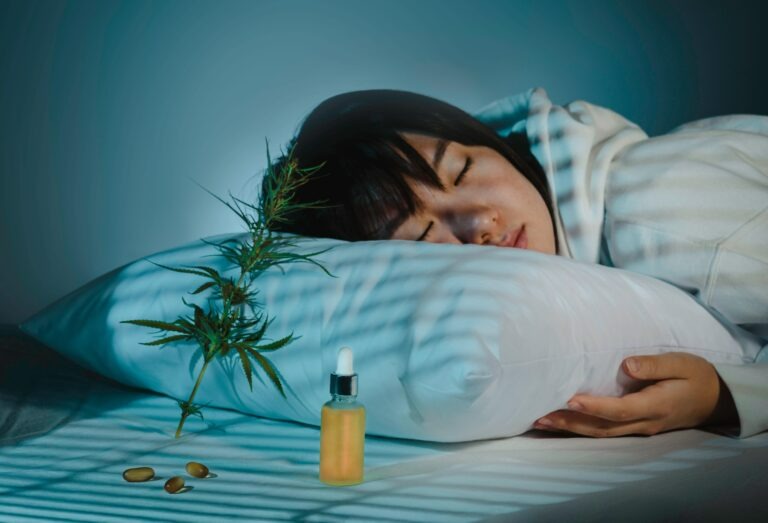Disclaimer: This article is for informational purposes only and should not be considered medical advice. Always consult a licensed healthcare professional before making decisions related to your health, sleep, or potential use of cannabis.
Deep Sleep: Unlocking the Most Restorative Stage of Rest
Sleep is not just about the number of hours you spend in bed. The quality of your sleep—particularly the time you spend in deep sleep—plays a far greater role in restoring your body and mind. Deep sleep, also known as slow-wave sleep, is the most rejuvenating stage of the sleep cycle, when the body repairs itself, memories are consolidated, and the brain detoxifies.
In recent years, lifestyle changes, digital distractions, and rising stress levels have made it harder for many people to get the deep rest they need. While some individuals turn to supplements or alternative options like cannabis, the foundation of healthy deep sleep still lies in natural, evidence-based strategies.

What Is Deep Sleep?
Deep sleep is one of the four main stages of sleep and is characterized by slow brain waves, relaxed muscles, and reduced heart rate. It typically occurs in the first half of the night and makes up about 20–25% of total sleep for a healthy adult.
During deep sleep, the body:
-
Repairs muscles and tissues.
-
Boosts the immune system.
-
Consolidates memories and learning.
-
Releases growth hormones important for recovery.
Without sufficient deep sleep, even eight hours in bed may leave you feeling groggy and unfocused.

Why Deep Sleep Matters
Studies show that inadequate deep sleep is linked to a variety of health problems, including:
-
Weakened immune response.
-
Higher risk of chronic diseases such as diabetes and hypertension.
-
Increased stress and irritability.
-
Impaired cognitive performance and memory loss.
Simply put, deep sleep is the foundation of long-term health.
The Role of Cannabis in Sleep
Cannabis has been a subject of research when it comes to sleep, particularly because of compounds like THC and CBD. Some studies suggest that certain cannabinoids may help people fall asleep more quickly, and some users report fewer nighttime awakenings.
However, research also indicates that long-term use may alter sleep architecture, including reducing REM sleep—the stage connected to dreaming and memory processing. For this reason, health experts generally recommend approaching cannabis as a potential sleep aid with caution, and always under professional guidance.
In short, while cannabis might provide short-term relief for occasional insomnia, it is not considered a guaranteed or risk-free way to achieve consistent deep sleep.

Natural Ways to Improve Deep Sleep
If your goal is to enjoy more restorative rest, consider the following science-backed strategies:
-
Keep a Consistent Sleep Schedule
Going to bed and waking up at the same time every day strengthens your circadian rhythm. -
Limit Caffeine and Alcohol
Both substances can interfere with deep sleep cycles. -
Create a Sleep-Friendly Environment
A cool, dark, and quiet bedroom encourages deeper rest. -
Exercise Regularly
Physical activity helps increase time spent in slow-wave sleep, particularly when done earlier in the day. -
Practice Relaxation Techniques
Meditation, gentle yoga, or breathing exercises before bed reduce stress and support deeper sleep.
Professional Guidance Matters
If sleep problems persist, it is important to speak with a healthcare professional. Insomnia and disrupted deep sleep can sometimes signal underlying health issues that require medical attention.
While cannabis research continues to evolve, experts caution that it should not replace proven sleep hygiene practices or medical treatments. A doctor can help you determine safe and effective solutions tailored to your individual needs.
Conclusion
Deep sleep is the stage of rest that your body and mind crave most. It restores, heals, and prepares you for the day ahead. Although some people turn to cannabis for its potential sleep-inducing effects, research remains mixed, and long-term impacts are not fully understood.
The best way to improve deep sleep still lies in healthy routines: consistent schedules, stress management, and a supportive sleep environment. For anyone considering other options—including cannabis—it is essential to seek professional advice first.
By prioritizing deep sleep naturally, you can achieve not only better nights but also brighter, healthier days.
Sources
-
Centers for Disease Control and Prevention (CDC). How Much Sleep Do I Need?
-
National Institutes of Health (NIH). The Science of Sleep.
-
Sleep Foundation. Stages of Sleep.
-
American Academy of Sleep Medicine. Sleep and Health.
-
Babson, K.A., et al. (2017). Cannabis, Cannabinoids, and Sleep: a Review of the Literature. Current Psychiatry Reports.
Watch here:

